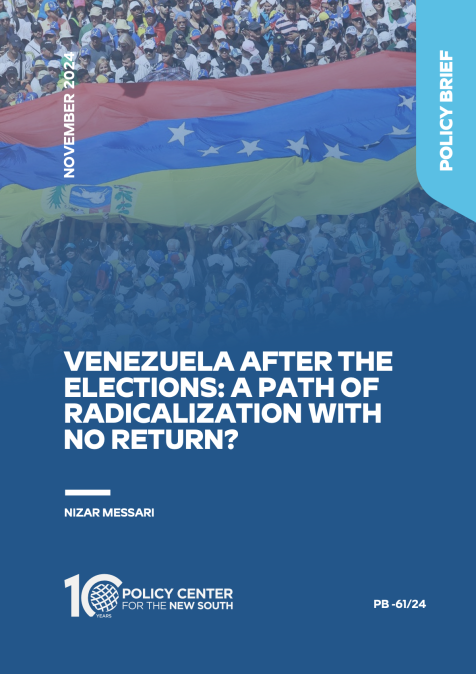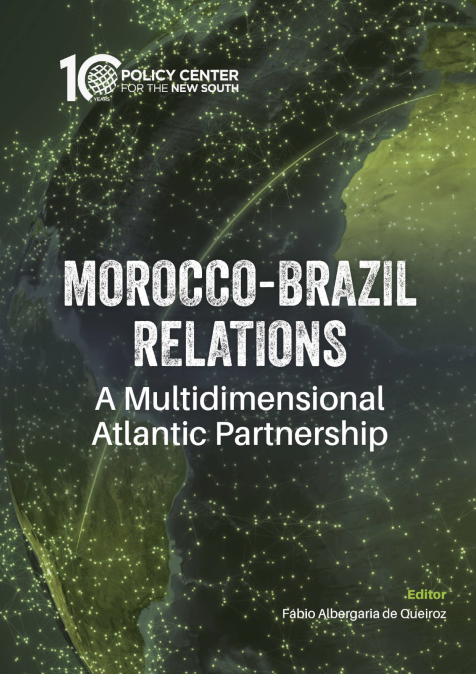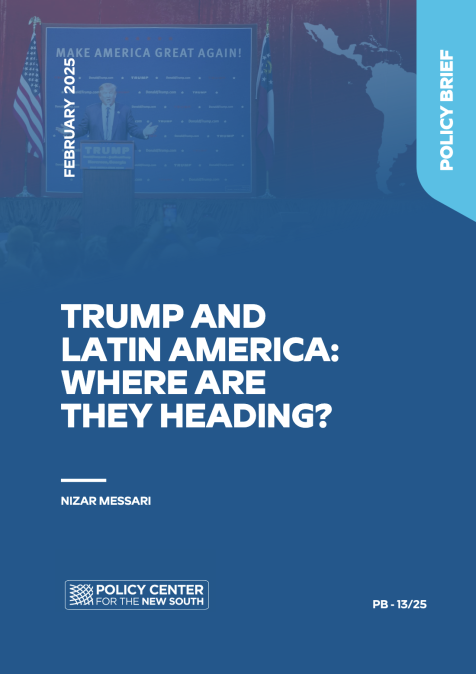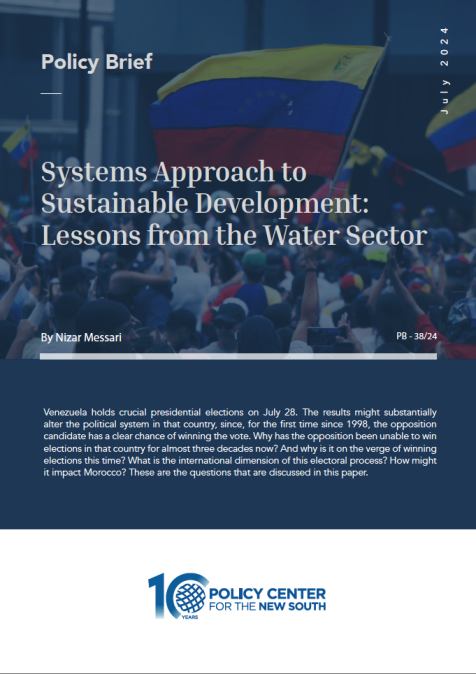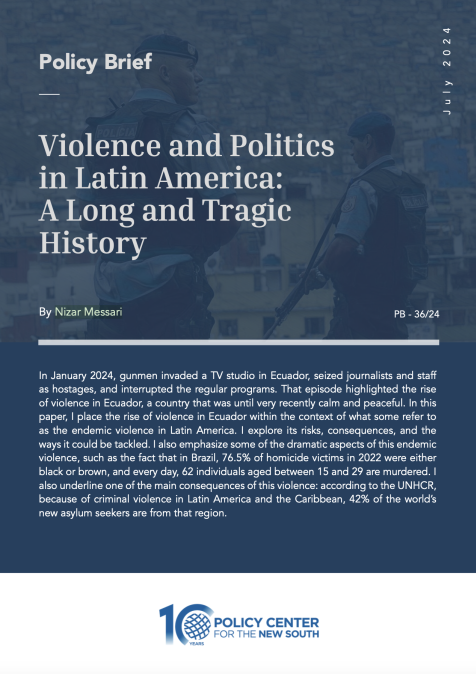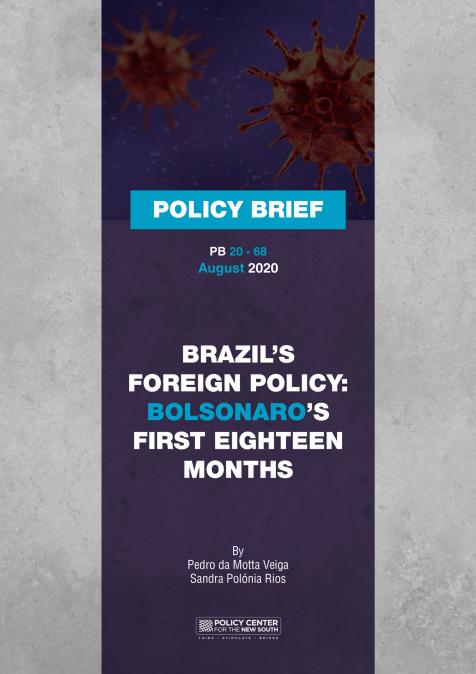Publications /
Policy Brief
Developments in Venezuela since the presidential election of July 28, 2024, epitomize the fault lines of contemporary world politics. The elections failed to clarify the political situation in Venezuela. Instead, they complicated it. The official electoral authority declared Mr. Nicolás Maduro the official winner of the elections, with a narrow but comfortable margin, while the opposition also declared its candidate, Mr. Edmundo González Urrutia, the legitimate winner of the elections. This has deepened the political rifts in the country, turning it into a regional, and to a certain extent global, hotspot.
Introduction
At the global level, the immediate recognition of the election results by China, Iran and Russia—all regimes not known to have brilliant records of respect for democracy and for human rights—clashed with the fact that neighboring democracies in Latin America, including states that were until very recently allies of the Maduro regime, as well as the European Union (EU) and most of its member states, the United States (US), the United Kingdom (UK), and Canada have not recognized the election results. The election also confirmed the increasing polarity of world politics, in which politics of ‘friends and enemies’, according to which states support their friends no matter what the circumstances are, and condemn their foes, also no matter what the circumstances are, define political reactions more than values or facts on the ground.
Regionally also, these developments reveal an increasing polarization between states that immediately rejected the official results—with some going further and recognizing the results announced by the opposition as the only valid results—and those that are trying to mediate in the conflict and avoid an eventual showdown that might result in bloodshed or, even worse, a protracted internal conflict.
Finally, domestically, both sides declared different results and rejected each other’s results. They announced their side as the winner of the election, and denied any validity to the results presented by the other side, although it is important to note that the opposition has produced evidence, which it admits is partial, to back its statements, while the Maduro regime has not produced any evidence to back its claims, despite domestic and international pressure to do so. Maduro has evaded those requests by alleging—again without any evidence—that the electoral court computers were hacked by the opposition on election night, seeming to indicate that it is unable to present evidence because of that, although this has not been said explicitly.
It is also true that nationally, regionally, and globally, lessons from the recent Venezuelan past have been learned by all sides. At local level, the opposition declared that it won the elections, but refrained from declaring Mr. González Urrutia as president elect, as it did after previous presidential elections, when it declared the president of the parliament, who was from its ranks, as the interim president. Simultaneously, the regime of Mr. Maduro allowed Mr. González Urrutia to leave the country and seek exile in Spain. Regionally, the main neighbors of Venezuela—Brazil and Colombia—jointly with Mexico, also refrained from siding with either side as they did in the past, and are trying to find options that would avoid further polarization or bloodshed. Finally, internationally, the U.S., the EU and its main member states have also refrained from recognizing the opposition candidate as the winner, as they did in the previous election cycle in Venezuela.
This policy brief explores these fault lines and present the different possible scenarios for Venezuela, identifying the risks that accompany them, and the possibilities for breakthroughs. The long transition period between election day and the presidential inauguration day can be propitious either for meditation to take place in order to avoid the irreparable, or for one side to prevail. In January 2025, if President Maduro is installed as president without showing evidence of his alleged electoral victory, the risks of clashes along all three fault lines discussed above will be magnified, and the costs for a peaceful solution might become far higher than they are now.
National Fault Lines, or the Facts on the Ground
The presidential election in Venezuela resulted in a major political stand-off. Although the electoral authority, the National Electoral Council (Consejo Nacional Electoral, CNE), declared that Mr. Maduro had won the elections on the basis that he received 51% of the votes, while his opponent received 44% of the votes, the opposition has vigorously contested the result and has provided partial evidence to justify its claim. The opposition showed evidence from 70% of the electoral precincts that confirmed that its candidate, Mr. González Urrutia, had won approximately 70% of the votes in those precincts, and that therefore, he was the legitimate winner of the elections, not Mr. Maduro.
One consequence of this clash has been that the regime and its opponents have confronted each other in the streets, and the regime has very often violently repressed the generally peaceful demonstrators. Moreover, the Supreme Court confirmed the electoral results announced by CNE, which indicated the regime’s intent to go ahead with those results and pave the way for a new mandate for Mr. Maduro. Additionally, Mr. Maduro’s regime brought terrorism charges against both Ms. Maria Corina Machado—the widely popular leader of the opposition—and Mr. González Urrutia, the opposition candidate. As they refused to show up to courts, they were both declared in contempt of justice. Meanwhile, the regime continued to violently repress street demonstrations led by the opposition, and to kill scores of demonstrators and send others to jail. The heightened tensions between the regime and the opposition led Mr. González Urrutia to seek political asylum in Spain, to which the regime of Mr. Maduro agreed.
The departure of Mr. González Urrutia represented a major blow to the opposition, as it deprived it of its symbolic leader and its self-proclaimed election winner, potentially indicating that he and his allies did not believe that reversing the process in which the regime was engaged was possible to achieve from Venezuela. The benefit of Mr. González Urrutia representing forcefully the voice of the opposition in international forums and going abroad to make the case against the regime was certainly a plus for the opposition, but when he left, he also undermined the morale of the opposition: his departure indicated that the regime’s repression was effective and violent, confirming thus the fears of the population. Not surprisingly, since Mr. González Urrutia left the country and went to Spain, popular mobilization has lost steam. Demonstrations against the regime have been less well attended, and popular enthusiasm to oppose the regime and its proclaimed electoral victory has been lower. The question asked by the population is: if the person we trusted and voted for has given up the fight, why should we keep it alive?
The events after the presidential elections underlined that the Barbados Accords, which were mediated by several external powers, including the U.S. and Brazil, and under which the regime and the opposition agreed on rules to guarantee a smooth electoral process in Venezuela, had failed. Early signs of the limitations of those accords became evident even before the elections, when, for instance, the candidacies of Maria Corina Machado and of her nominated successor, Corina Yoris, were both rejected, forcing the opposition leadership to quickly seek a new candidate, which ended up being the retired diplomat and very discreet Mr. González Urrutia. The constant harassment of opposition leaders, which included the jailing of some, represented clear evidence that the Barbados Accords were not going to guarantee a smooth, transparent, democratic, and fair electoral process. The conflictual post-election environment represented a clear confirmation of the failure of those accords, which had been hailed by the international community as a turning point in the development of events in Venezuela.
The electoral process in that country was also a confirmation that legality does not necessarily mean fairness and justice: Mr. Maduro’s victory was announced by the electoral court and confirmed by the Supreme Court of Venezuela. But since both courts are dominated by allies of Mr. Maduro and by judges appointed by him, the legal credibility of their statements is low. Independent organizations that had been allowed to observe the electoral process, such as the Carter Center, declared that the electoral results announced by the regime were not “verifiable” and hence lacked credibility. Furthermore, former close allies of the regime, including the governments of Brazil and Colombia, have made it clear that they cannot recognize the validity of the presidential elections or the legitimacy of the electoral process as long as the regime of Mr. Maduro is unable to present evidence of his electoral victory, which he never has. With that, and with the exception of a few international allies, the electoral victory claimed by Mr. Maduro has no validity and is not recognized, either nationally or by organizations accredited to confirm those results. Nevertheless, Mr. Maduro seems to be clinging to power and will be confirmed as president on January 10, 2025—inauguration day in Venezuela, no matter what.
International Fault Lines
Consequently, although President Maduro was quickly and warmly congratulated by some of his main global allies, the legitimacy of the election results was quickly put in doubt by Latin American leaders, and by the U.S., EU and many of its member states, including Spain, the former colonial power, which is also governed by a left-wing coalition, further underlining the isolation of the regime of Mr. Maduro. More significantly, left-leaning leaders from Latin America, including Presidents Lula of Brazil, Petro of Colombia, and López Obrador in Mexico (who was still the effective president of the country until the inauguration in October 2024 of his successor and ally, Ms. Sheinbaum), have also not recognized the alleged electoral victory of Mr. Maduro, and have asked for proof of the victory in order to do so. The regional dimension of the fault line will be discussed in the next part of this paper, and the focus will remain in this part on its international dimension.
Reflecting the growing tensions between the U.S. and its main Western allies, and China and Russia, the governments of the latter two countries, along with Iran, immediately recognized the results of the presidential elections and congratulated Mr. Maduro on his re-election. This provided Mr. Maduro with a mantle of international legitimacy that was very welcome, especially because China and Russia are permanent members of the UN Security Council, and can potentially veto unfriendly—and eventually threatening—resolutions from that council. Those governments gave immediate credit to the statements of the Venezuelan electoral authorities, and did not need any further proof that Mr. Maduro had indeed won the elections.
Meanwhile, on the opposite side of the world’s evolving power distribution, the U.S., the EU, and many of its member states, including Spain, held back from recognizing the results of the elections and requested that the electoral authorities present proof to justify their statements. Some of these Western countries acknowledged the results presented by the opposition and deemed them credible, although they have not recognized Mr. González Urrutia as the winner of the elections. In this sense, the Western powers learned from the mistakes of the past as, in 2018, they recognized Juan Guaidó, who was then president of the legislative assembly and from the ranks of the opposition, and who was proclaimed by the opposition as the legitimate interim leader of the country, in a process that ended up being a total failure for Mr. Guaidó, the opposition and its Western allies, because Mr. Maduro remained firmly in power. This time, Western countries are avoiding hasty decisions that would force their hands. They are opting to wait for eventual developments before they act. Meanwhile, Mr. Maduro remains in power and is set on being sworn in for his new mandate.
In sum, internationally, reactions have been split along ideological lines, as traditional non-regional allies of Mr. Maduro’s regime recognized his electoral victory, whereas his adversaries have rejected those results, even if most of them have stopped short of recognizing the results declared by the opposition which would have thrown the country into further chaos and instability.
Regional Fault Lines
The most noticeable reactions were at regional level. While the reactions of Latin American countries ruled by strong right-wing leaders, including Argentina, Ecuador, El Salvador, and Peru, were not surprising, that of the Chilean President was. Mr. Boric, Chile’s president, is a leader from the left, who would have been expected to show some support—just like the regimes in Cuba and Nicaragua, for instance—or at least, some indulgence, toward the regime of Mr. Maduro. But Mr. Boric was among the first world and regional leaders to demand from the Venezuelan electoral and political authorities disclosure of the results from the precincts, to support the claim that Mr. Maduro had won. Moreover, Mr. Boric quickly joined the chorus of world leaders who gave credibility to the non-official results announced by the opposition. As eye-catching as the reaction of the President of Chile were the reactions of more traditional left-wing heads of state from Brazil, Colombia, and Mexico. As noted earlier, Presidents Lula, Petro, and López Obrador refrained from recognizing the official results, have demanded the publication of the results of the precincts, and have tried, sometimes jointly, sometimes not, to offer mediation to the two parties in Venezuela, without success.
Some countries quickly questioned the results declared by the electoral court, and openly supported the opposition’s claims. These countries ended up being accused by the Venezuelan government of interfering unduly in Venezuela’s internal affairs, leading the regime of Mr. Maduro to cut diplomatic ties with them. These were Argentina, Chile, Costa Rica, Panama, Peru, the Dominican Republic, and Uruguay—not all ruled by hardline right-wing governments. One of the consequences of that turn of events was that a few leaders from the opposition ranks who had sought refuge in the embassy of Argentina, which, according to the Vienna Convention on diplomatic relations, is Argentine territory, were at risk as the building where they were hiding lost the advantage of extraterritoriality. Fortunately for them, the government of Brazil, in agreement with Argentina, immediately offered to extend its diplomatic mantle to those facilities, thus guaranteeing the safety of those opposition leaders. This earned Brazil increased credibility with Venezuela’s opposition leaders, or at least some of them. However, these moves indicated that the government of Mr. Maduro would not bend easily to external pressure. This played certainly a crucial factor in the strategy adopted by Brazil, Colombia, and Mexico.
Indeed, it is important to note here that after the arrival of Presidents Lula and Petro to power in their respective countries, relations between the regime of Mr. Maduro and those important neighbors of Venezuela had improved substantially compared to the time of their predecessors. Improved and stronger relations provided those two governments, as well as that of Mexico under President López Obrador, with some influence over Mr. Maduro and his government. All three countries tried to mediate between the government and opposition forces, not always successfully, and all three countries kept trying to steer Mr. Maduro from radicalization, earning them some level of trust from opposition leaders, even when Mr. Maduro started tearing apart the already-mentioned Barbados Accords. Their strategy was to try to keep open lines of communication both with him and with the opposition, in order to steer events onto positive paths, and avoid the most radical positions from both sides, and mainly from Mr. Maduro’s side.
These countries did not reject outright the results announced by the electoral court. Instead, they asked for transparency and for the publication of the results of all electoral precincts to back up those results. Simultaneously, they neither rejected, nor did they embrace, the results communicated by the opposition, but underlined that they were incomplete and could not be considered final or official. By doing so, they kept the opposition at arm's length without embracing the regime, and aimed to bring both sides to agreement on some new common ground. They also worked at convincing major external powers, mainly the U.S., EU, and its most relevant member states for Venezuela, to hold back from recognizing Mr. González Urrutia as the legitimately elected president, thereby making a bad situation even worse. However, neither the Maduro regime nor the opposition were willing to compromise. Both declared they were offended by the lack of respect shown to the Venezuelan people by the three major Latin American countries.
One of the virtues of the current situation in Venezuela is that it shows that democracy and democratic norms are taken seriously in Latin America, no matter how radicalized the politics in the region: countries led by prominent left-wing leaders—from Brazil to Mexico, and from Chile to Colombia—did not support the regime of Mr. Maduro just because it is led by a leftist leader. Those leaders reiterated that ideological solidarity has limits, and democratic norms have to be respected, at least in Latin America. This is even more laudable because left-wing non-democratic regimes, such as those in Nicaragua and Cuba, did extend their immediate warm support to the regime of Mr. Maduro, despite all the signs that the results announced by it had been rigged. Standing by democratic norms was also noticeable in Brazil, where the president suffered from considerable internal pressure from the left to show more support to Mr. Maduro and his re-election, which he resisted.
The Brazilian reaction deserves indeed some special attention, because under former President Bolsonaro, Brazil was one of the main critics of Venezuela and its 2018 presidential elections. Brazil was hence among the supporters of Mr. Guaidó, establishing diplomatic relations with the then interim president instead of with Mr. Maduro’s regime. Moreover, Mr. Maduro ended up being unable to attend the inauguration of President Lula because he was banned from visiting Brazil; only when Lula officially signed a decree lifting the ban could Mr. Maduro visit Brazil. Thus President Lula had a lot of credit with Mr. Maduro. Moreover, Lula’s party, the Worker’s Party, was among the first foreign political parties to congratulate Mr. Maduro on his election, and to lead a campaign in defense of the Venezuelan electoral process. In this sense, the non-recognition of the 2024 official election results by Lula’s Brazil, despite internal pressure from Mr. Lula’s own political party, represented a serious blow to Mr. Maduro and his internal political allies. It is true, however, that the Brazilian government feared the worst-case scenario in Venezuela: its internal analysis considered that political violence and even a civil war were possible, and that the situation had to be handled cautiously to avoid making it worse.
But that voice of reason has not found corresponding voices in Venezuela. Brazil, and Lula’s special envoy, former foreign minister Celso Amorim, progressively lost influence in that country. Indeed, when in July 2024, the Brazilian electoral process was criticized by radical voices in the Venezuelan regime, they were quickly and forcefully rejected by representatives of Maduro’s government who were forced to distance themselves from those statements. But in September and October, personal insults were issued by prominent allies of Mr. Maduro against Brazil in general, and against its president in particular, which the Brazilian government refrained from answering or even commenting on.
The crisis between the countries came to a head at the BRICS summit in Kazan, Russia, in October 2024. Venezuela’s request for admission to the group, lukewarmly supported by both Russia and China, was adamantly rejected by Brazil and blocked. That episode infuriated Mr. Maduro and his regime, prompting them to take the crisis with Brazil to new levels: the Brazilian chargé d’affaires was summoned to the Venezuelan ministry of foreign affairs to explain what was considered Brazilian hostility towards Venezuela, and the Venezuelan ambassador in Brazil was called back to Caracas for consultation. Those two steps, when taken together, are among the highest levels of diplomatic tension short of cutting off diplomatic relations. In other words, Brazil’s evolution from asking for the results from the precincts to offering to mediate between the regime and the opposition—which implicitly indicated that it did not accept the results announced by the Venezuelan electoral court—to blocking the admission of Venezuela into the BRICS, brought the relations between the countries to the brink of rupture. The fact that the government of Mr. Maduro is behind the increased tensions is an indication of how confident it is that it can survive a crisis with a former ally like Lula’s Brazil.
In conclusion, regional attachment to democratic norms rather than ideological affinities has played a role in the reactions in the region to the political scenario in Venezuela. Traditional allies of Mr. Maduro and left-leaning governments have not recognized his declared electoral victories, and have been asking for more transparency in that process.
Three Scenarios are Possible
In these circumstances, three scenarios are possible. First, street confrontations between the regime and the opposition—and the population at large—get totally out of control and result in major bloodshed, which might push the army to force Mr. Maduro to accept mediation, or even to accept the results declared by the opposition and to step down. At this stage, with opposition candidate Mr. González Urrutia in exile, and the waning in the size and fervor of the demonstrations called by the opposition, this scenario seems unlikely, unless demonstrations gain in momentum and strength with the approach of the eventual swearing in of Mr. Maduro on January 10.
The second scenario is successful international or regional mediation between the regime and the opposition. Mediation would call either for new elections, with more transparent rules, or for power sharing under specific conditions, and under international supervision, and with guarantees to both sides on their political and physical survival. This scenario gained some credibility in late summer 2024, as Brazil and Colombia, and to a certain extent Mexico, gained credibility with both sides of the Venezuelan political spectrum while managing to convince non-regional powers to refrain from taking strong measures against the regime. But it lost steam after tensions heightened between Brazil and Venezuela, and after the opposition rejected any significant concessions that would not mean the swearing-in of its candidate as president, on January 10, 2025, inauguration day.
The third scenario is that Mr. Maduro digs in with the support of the army, as in 2018, and with the explicit acquiescence of China and Russia, which he has already earned, as shown in their modest support for Venezuela’s entry to the BRICS. This would result not only in his swearing in as president, but also in his increased international isolation, while the opposition will be pushed towards further radicalization. In these circumstances, the temptation will be substantial for Mr. Maduro to divert national attention from his problems by fabricating an international crisis that would mobilize the country behind him—against Guyana, for instance, as he already tried to do in 2023.
This scenario, with or without an artificial crisis that Mr. Maduro might create with Guyana, is the most likely at the present juncture, given the relative demoralization of the opposition, the strong support Mr. Maduro gets from the army and from other established institutions in the country, including the judiciary, the support Mr. Maduro has received from China and Russia, and the low likelihood of any successful international mediation between his regime and the opposition. In fact, the above-mentioned crisis Mr. Maduro is staging with Brazil is an indication of how he and his allies are confident that they are in control of the situation, both domestically and internationally, and how adamant they are about going ahead and inaugurating him for his third mandate.

